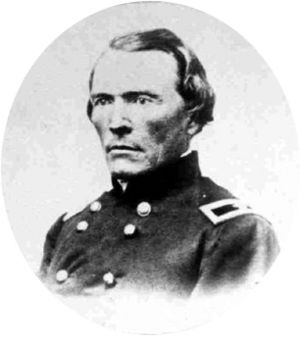James G. Spears facts for kids
Quick facts for kids
James G. Spears
|
|
|---|---|
 |
|
| Born | March 29, 1816 Bledsoe County, Tennessee |
| Died | July 22, 1869 (aged 53) Bledsoe County, Tennessee |
| Buried |
Pikeville City Cemetery, Pikeville, Tennessee
|
| Allegiance | United States of America Union |
| Service/ |
United States Army Union Army |
| Years of service | 1861–1864 |
| Rank | |
| Commands held | 1st Tennessee Infantry Regiment 25th Brigade, Army of the Ohio 1st Brigade, 2nd Division, XIV Corps |
| Battles/wars | American Civil War • Camp Wildcat (1861) • Mill Springs (1862) • Cumberland Gap (1862) • Stones River (1863) • Chickamauga (1863) • Knoxville Campaign (1863) |
James Gallant Spears (born March 29, 1816 – died July 22, 1869) was an American general. He served in the Union Army during the Civil War. He led a group of soldiers mostly from Tennessee who supported the Union.
Spears fought in early battles around the Cumberland Gap. Later, he marched with the Army of the Cumberland. He took part in important battles like Stones River and Chickamauga. He also helped during the Knoxville Campaign.
Spears was a strong supporter of the Union in the South. In 1861, he became a vice president of the East Tennessee Convention. This group wanted East Tennessee to become a separate state that stayed with the Union. However, Spears did not agree with the Emancipation Proclamation. He was removed from the Army in 1864 for speaking against it.
Contents
Early Life and Beliefs
James Gallant Spears was born in Bledsoe County, Tennessee. He was the oldest of five children. His father was a doctor. As a child, his family faced money problems.
Spears loved to read and taught himself many things. He eventually studied law. In 1848, he was elected as a court clerk. By 1851, he owned a large farm near Pikeville.
Before the Civil War, Spears was against states leaving the Union. He represented Bledsoe County at the 1861 East Tennessee Convention. He was chosen as the convention's vice president. Spears strongly believed that East Tennessee should form its own state. This new state would stay loyal to the Union.
Joining the Union Army
Spears was disappointed when the convention chose a peaceful approach. He went back home, not planning to join the war. But in late 1861, he learned that Confederate leaders wanted to arrest him. They thought he was disloyal.
Spears escaped to Kentucky. There, he met other Union supporters from Tennessee. He helped create the 1st Tennessee Infantry Regiment. In September 1861, he became a lieutenant colonel. This regiment fought in the Battle of Camp Wildcat and the Battle of Mill Springs.
Key Battles and Leadership
Spears was promoted to brigadier general on March 5, 1862. He took command of the 25th Brigade of the Army of the Ohio. In June 1862, his brigade helped capture the Cumberland Gap. This was an important mountain pass.
In August, Spears led a small attack into Tennessee. He scattered a Confederate group near LaFollette. Some Union generals worried that Spears was too harsh. They thought he might be too hard on Confederates in East Tennessee.
In October 1862, Spears's brigade joined the Army of the Cumberland. This army was led by General William Rosecrans. They marched south to Nashville. Then they went after the Confederate Army of Tennessee.
In late December, the armies met at the Battle of Stones River. This battle was near Murfreesboro. Spears helped bring 303 wagons of supplies to the front lines. These supplies were badly needed. He also helped capture a key area called the "Round Forest." This helped the Union Army win.
By spring 1863, some officers under Spears complained about his leadership. They accused him of not being good at his job. Spears was put on trial by the army, but he was found innocent. He got his command back. When he returned, he was very strict. He even threatened to arrest any officer who tried to quit.
In September 1863, Spears's unit was at Lookout Mountain. This mountain overlooked Chattanooga. A Confederate force attacked him. But General Rosecrans ordered him to leave the mountain. This was to avoid being captured.
In December 1863, Spears led his brigade north. They went to help Union soldiers in Knoxville. Knoxville was being surrounded by Confederate forces. Spears defeated a small Confederate group near Kingston. He also captured six guns at Loudon.
Disagreement and Dismissal
General Spears strongly disagreed with President Abraham Lincoln's Emancipation Proclamation. This proclamation declared many enslaved people free. Spears spoke out angrily against it.
He was arrested for his statements in February 1864. He was then put on trial by the army again. Spears admitted he disagreed with the proclamation. But he said he was not disloyal. Still, he was found guilty. He was ordered to be removed from his command.
He was given a chance to resign, meaning to quit his job. But he refused to resign. So, he was officially dismissed from the Army on August 30, 1864.
Life After the War
After being dismissed, Spears went back to his farm in Bledsoe County. He worked to rebuild his wealth. His health had suffered during the war. It continued to get worse.
He passed away at his home on July 22, 1869. He was buried in the Pikeville City Cemetery.
Spears married Adeline Brown in 1849. They had six children together. One of his sons, William D. Spears, became a well-known lawyer. Another son, Napoleon Bonaparte Spears, served in the Tennessee and Alabama state legislatures.
 | Isaac Myers |
 | D. Hamilton Jackson |
 | A. Philip Randolph |

